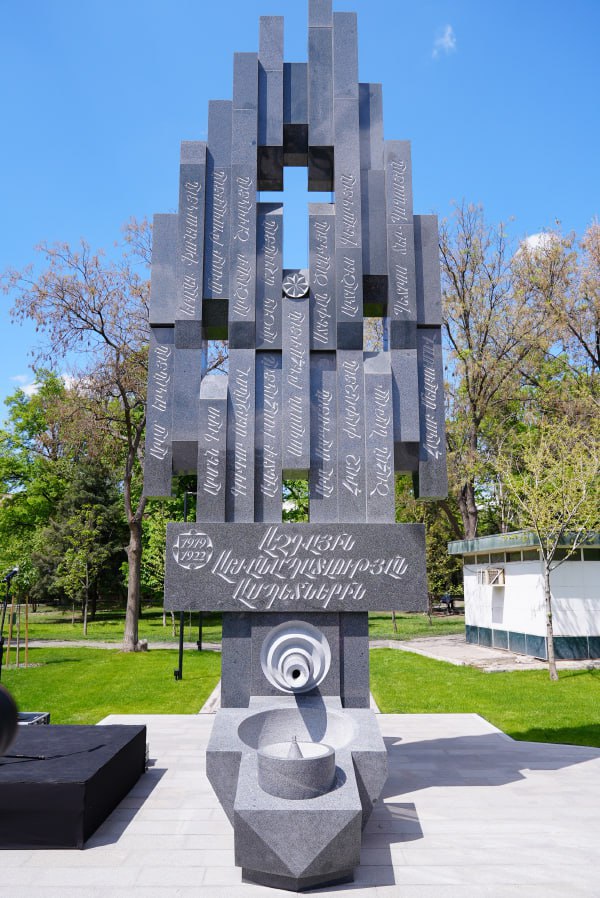by Yeghia Tashjian
On April 25, 2023, a fountain memorial was opened in Yerevan to commemorate the heroes of “Operation Nemesis.” The secret operation took place between 1920-1922 and was decided at the 9th International Congress of the Armenian Revolutionary Federation (ARF) that took place in 1919 in Yerevan, aiming to punish the perpetrators of the Armenian Genocide as well as the organizers of the Baku massacre against the Armenians (1918). “Nemesis” was a clear and meticulously designed operation, which began with intelligence work in Turkey, the Caucasus, Europe and the US by ARF leaders and operators to avenge the horrors committed against the Armenians. The operation was masterminded by Shahan Natalie, Armen Garo and Aharon Sachaklian and was named after the Greek goddess of divine retribution. The fountain memorial was installed by the decision of the Yerevan City Council. The creator of the sculpture is architect Tigran Barseghyan. The idea came after many petitions were submitted by descendants of the avengers to the Yerevan City Council.
Turkey, which has named dozens of streets after criminals and Genocide perpetrators, has reacted harshly to the opening of the memorial. Turkey’s presidential spokesperson Ibrahim Kalin argued that this move “could not be left without an answer,” most probably referring to Turkey shutting its airspace for Armenian flights heading to a third destination. Turkey’s Foreign Ministry also commented saying: “We strongly condemn the opening of the ‘Nemesis Monument’ in Yerevan, which is dedicated to the perpetrators of the assassinations against Ottoman political and military leaders in the early 1920s, and Azerbaijani officials of the time, as well as even some Ottoman citizens of Armenian origin (referring to the Armenian traitors who were assassinated during the operation).”
Read also
Turkey’s Foreign Minister Mevlut Cavusoglu called on Armenia to demolish the monument, calling it an “affront” to Turks and Azerbaijanis. He also warned that if Yerevan doesn’t remove the monument, Ankara “will take retaliatory measures.”
Although Armenia’s PM distanced himself from the issue by calling the installation of the monument “wrong,” Armenia’s National Security Chief Armen Grigoryan told reporters that the erection of the monument was a domestic issue for Armenia and “no one has the right to interfere in these issues.” He also emphasized that normalization with Turkey should be without conditions. The City Council announced that it doesn’t intend to dismantle the memorial.
But was Turkey’s reaction and the closure of its airspace to Armenian airlines directly related to the opening of the monument? Of course not! Turkey’s reaction should be viewed from the lens of the presidential and parliamentary election processes as President Erdogan is eager to attract the votes of nationalists. That’s why a day before Turkey’s decision to close its airspace, Azerbaijani President Ilham Aliyev visited Turkey and announced his support for the incumbent. One of Azerbaijan’s major news agencies Report.az published an op-ed glorifying Erdogan and his era. Aliyev is well aware that Erdogan’s departure would isolate him and put him completely at Moscow’s mercy. Moreover, his public support for Erdogan has created tension with the joint opposition candidate, the Kemalist Kemal Kılıçdaroğlu.
On May 6, as part of his electoral campaign promises, Kılıçdaroğlu proposed a trade map connecting Turkey to China. Interestingly, this map bypasses the South Caucasus and instead goes through Iran. Many Azerbaijanis expressed anger as they believe this is the abandonment of Baku’s Ankara-backed “Zangezur Corridor” project. Kılıçdaroğlu’s map reflects a highway and railway project that connects Turkey to the Turkic States of Central Asia and China. His idea, however, is complex. He argued that the project will anger both the West and China. He said that this project’s realization depends on China’s treatment of Uyghurs (an attempt to attract the votes of nationalists). The Turkish opposition candidate said that the trade route will pass from “Turkestan” (the region in northwestern China where the Uyghurs are concentrated). He said this is not the “East nor the West way but the Turkish way,” insisting on Turkey’s central role in the trade routes in Eurasia.
This has provoked Aliyev, who while visiting the occupied parts of Artsakh, angrily responded: “Even today, there are those who want to remove Azerbaijan from the Middle Corridor, but their dreams will remain in their eyes.” Kılıçdaroğlu’s statements also triggered widespread negative reactions on Azerbaijani social media channels.
“For a state with a population of 80 million people, the Armenians are not a quantitative, but qualitative threat,” said political commentator Hrachya Arzumanian. “Until we answer the question of what qualities of Armenians are perceived as a threat in Turkey, we will not be able to build a real relationship.” Arzumanian added that Turkey is not interested in establishing diplomatic relations with Armenia. “In order for Turkey to be ready to listen to us, we need to become stronger,” he argued.
As the opposition leader is aiming to attract liberals, minorities and marginalized political and economic groups, Erdogan and his party are aiming to mobilize conservatives and nationalists. For now, all eyes are on Turkey as the country will witness tense parliamentary and presidential elections that will shape Turkey’s foreign policy in the coming years amid crucial regional developments.






















































